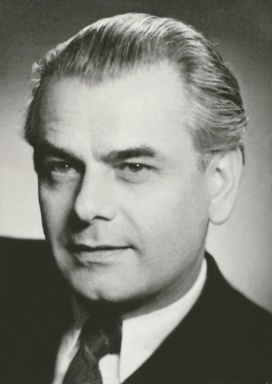Dr. Felix Hurdes

Personalia
Born:
Died:
Profession:
Persecution:
Imprisonment 11.03.1938 - 22.05.1938,
Dachau concentration camp 22.05.1938 - 26.04.1939,
Imprisonment 23.10.1944 - 21.11.1944,
Mauthausen concentration camp 21.11.1944 - 18.01.1945,
Imprisonment Vienna Provincial Court 18.01.1945 - 06.04.1945
KZ Number:
Honors:
Anton Bruckner Ring
Grand Cross of the Order of Merit of the Federal Republic of Germany
Karl Renner Prize of the City of Vienna
Grand Decoration of Honor in Gold for Services to the Republic of Austria
Memberships
Curriculum Vitae
Born in South Tyrol, Felix Hurdes moved to Vienna-Wieden with his family in 1910. Here he attended the Elisabethgymnasium from 1913 to 1921 and joined the secondary school fraternity Herulia in 1918. During his time at school, he was one of the co-founders of the Christian-German Student Association (CDSB) in 1919. After graduating from high school, he studied law at the University of Vienna and obtained his doctorate in 1925. He then completed his year in court and also studied political science and economics. He then began his career as a lawyer, passed the bar exam in 1931 and opened a law firm in Klagenfurt in 1933. He became a functionary of the Vaterländische Front and from 1936 to 1938 a member of the Carinthian provincial government as a councillor for education and construction. In addition, he spoke out against Carinthian National Socialists, but also sought a compromise with the Social Democrats.
Immediately after the Nazi takeover, Felix Hurdes was arrested on March 11, 1938 and transferred to Vienna, where he was taken on the second transport to the Dachau concentration camp on May 22/24, 1938. He remained there until the end of April 1939. Felix Hurdes spent nine months of his imprisonment in the isolation block. After his imprisonment, he lived in Vienna and worked as a legal consultant for a construction company. Through Lois Weinberger, who later became Vienna's deputy mayor, he made contact with a group of underground Christian trade unionists. Together with Anton M. Pichler, he works in the group "Österreichischer Kampfbund
This abuse consisted of hitting, pushing and throwing the beaten person against the front door, which of course caused a corresponding noise.
Felix Hurdes later testified on March 7, 1946 in the criminal case against the Gestapo "chief" in charge at the time, Christian Nicoll, and told of his mistreatment.
On November 21, 1944, Felix Hurdes was arrested together with Lois Weinberger, Hans Pernter, Leopold Figl, Chaplain Heinrich Maier and others were sent to the Mauthausen concentration camp. There they were imprisoned in the bunker and interrogated by the Gestapo. On January 18, 1945, they were transferred to the death row of the provincial court in Vienna, where they were tried before the People's Court. Only the end of the war - the liberation on April 6, 1945 - saved Felix Hurdes from the guillotine.
After Austria's liberation, he was one of the founders of the ÖVP, was its General Secretary from 1945-1952 and became Minister of Education from 1945-1953 and President of the National Council from 1953-1959. He is a member of the ÖVP-Kameradschaft der politisch Verfolgten und Bekenner für Österreich
Places
Persecution:
Residence:
Multimedia
Citations
- Krause, Peter/Reinelt, Herbert/Schmitt, Helmut (2020): Farbe tragen, Farbe bekennen. Katholische Korporierte in Widerstand und Verfolgung. Teil 2. Kuhl, Manfred (ÖVfStG, Wien), p. 138/139.
Wiener Stadt- und Landesarchiv (WStLA)
